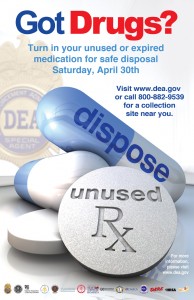LONDON – Operation UNITE has partnered with the federal Drug Enforcement Administration (DEA) to promote participation in its second National Prescription Drug Take-Back Day on Saturday, April 30.
 At least four locations in the UNITE region have joined more than 4,700 sites across the nation in the effort that seeks to prevent pill abuse and theft.
At least four locations in the UNITE region have joined more than 4,700 sites across the nation in the effort that seeks to prevent pill abuse and theft.
“This was an easy decision because it matches perfectly with the UNITE ‘Pill Dragon’ program,” said Dan Smoot, law enforcement director for UNITE. “Since we began taking the ‘dragon’ – a mobile incinerator – to communities last fall we have destroyed more than one-half million unused or out-of-date pills.”
Collection boxes will be available between 10 a.m. and 2 p.m. at three locations: Clay County Sheriff’s Office, Monticello Police Department and the Somerset Police Department.
In addition, the Rowan County UNITE Coalition has scheduled a special take-back program from 2 p.m. to 6 p.m. at the Carl Perkins Community Center in Morehead. That event is sponsored by the coalition, Morehead Police Department, Rowan County Sheriff’s Office and the Rowan County Board of Education.
Last September more than 60 Kentucky law enforcement agencies hosted drop-off sites that resulted in the removal of approximately 4,700 pounds of pharmaceutical controlled and non-controlled substance pills, stated Robert L. Corso, special agent in charge of the DEA’s Louisville District Office. Nationally more than 121 tons of prescription drugs were collected.
This initiative addresses a vital public safety and public health issue. Medicines that languish in home cabinets are highly susceptible to diversion, misuse and abuse.
“The 2008 National Survey on Drug Abuse Use and Health estimated that 6.2 million Americans using psychotherapeutic drugs with no legitimate medical need,” Corso noted. “Furthermore, the survey indicates more Americans abuse psychotherapeutic drugs more than cocaine, heroin and hallucinogens combined.”
Studies show that individuals that abuse prescription drugs often obtained them from family and friends, including the home medicine cabinet.
“This has been the focus of a four-month educational campaign, called ‘Accidental Dealer,’ by UNITE’s community coalitions to raise awareness of this issue. In many instances the finale event included a visit by the Pill Dragon – made possible through sponsorship by the Kentucky Army National Guard and Eastern Kentucky PRIDE – for a “Clean Your Medicine Cabinet Out Day” program.
“PRIDE is a key partner with this initiative because of the potential environmental hazards created through improper disposal of their unused medications,” Smoot said. “Too often these medications are flushed down the toilet or simply tossed in the trash. As a result, they end up in landfills, septic tanks and our drinking water supply.”
The first DEA Take-Back event “was an unprecedented opportunity to educate everyone about the growing prescription drug abuse problem,” said Michele Leonhart, DEA administrator. “Studies have shown that, for many, prescription drugs are the very first drugs they abuse – and all too often they aren’t the last. That is why we are committed to helping Americans keep their homes safe by ridding their medicine cabinets of expired, unused and unwanted drugs.”
Gil Kerlikowske, director of the White House Office of National Drug Control Policy who visited southern and eastern Kentucky in February, echoed this sentiment.
“Preventing these readily available and potentially deadly drugs from being diverted and misused is something each and every one of us can do to help reduce the epidemic of prescription drug abuse that is harming so many Americans,” Kerlikowske said.
Last fall Congress passed the Safe and Secure Drug Disposal Act of 2010, which amended the Controlled Substances Act to allow users of controlled substance medications to dispose of them by delivering them to entities authorized by the U.S. Attorney General. That act also allows long-term care facilities to dispose of their residents’ controlled substances in certain instances.
Regulations are currently being drafted by the DEA to implement the act.
To learn where collection sites are in your community go to www.dea.gov and click on the “Got Drugs?” banner.
